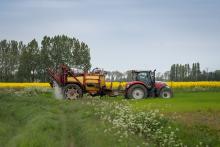Understanding crop producers’ perceptions around crop health decision making and the impact of that on key metrics such as pesticide usage

Increased uptake of Integrated Pest Management (IPM) measures on Scottish farms will be key in improving resilience against pests, weeds, and diseases, and maintaining or improving crop yields and farm profitability, whilst reducing environmental impact and reliance on pesticides. The aim of this project therefore was to improve the flow of IPM knowledge and its uptake and identify the drivers and barriers to further adoption of IPM practices for different decision makers and for different farm types.
The project team found that adoption of IPM is related to the risks associated with a reduction in pesticide use. There was higher potential for a reduction in pesticide use amongst the producers who were more able to consider taking risks associated with lower levels of control when the effect on profits is more quantitative (i.e. reduced yield) rather than qualitive (i.e. crop rejection). They recommend tailoring support programmes according to the varying perceptions and risk tolerance levels across different crop production sectors and advised the implementation of incentive programs or support payments to encourage the adoption of sustainable agricultural practices that reduce risks associated with pests and pesticides can reduce the level of economic risk associated with a reduction in pesticide use and thereby encourage further IPM adoption.
Image by Freddy from Pixabay
